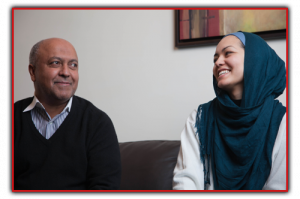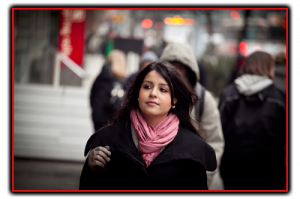One of the main criticisms of TLC’s All American Muslim was that the show’s characters were representative of only a small part of the American Muslim community. If you felt that way, then a great antidote is “Me, the Muslim Next Door,” a web documentary produced for Radio Canada International. Filmed in Montreal and Toronto in both English and French, “Me the Muslim Next Door” is over two hours of audio, video, and still photography, broken up into 4-6 minute segments, with each of the show’s participants having several segments. These segments took place in the participants’ personal landscapes – at home, on the street, with their families.

“Me, the Muslim Next Door” is cast like a cross between the United Nations and a Benetton ad. I love it. We have:
- Eduardo, a Brazilian convert who, by his own admission, used to hate Muslims;
- Dania, whose father is Eritrean and whose mother is a convert from Quebec;
- Mehdi, a Moroccan married to Laila from Afghanistan; they met on Facebook;
- Suad, whose mother is Syrian and whose father is part Palestinian, part Bosnian and, to add some fun to the mix, her husband Karim is part Finnish, part Egyptian;
- Rizwan, of South Asian background, who lives in Toronto and takes us to his neighbourhood masjid.
One of my recurring problems with Muslims in the media is that we are often portrayed answering the same questions in the same ways. Every show has something about polygamy or hijab or “fitting in.” We either go on tape with platitudes (“oh but you can only be polygamous if you afford it, isn’t it great that widows can be taken care of”), with statements designed to shock the middle classes (“jihad is ok for the kuffar!”), or with instant fatwas about how our religion says things in black and white (“Islam says music is BAD”).
These topics show up in the “Me the Muslim Next Door”, but the “personal landscape” format of the videos allows a fresh, personal light without bringing down the level of the discourse.

Mehdi and Laila, a mixed Sunni-Shia couple, explain that for them, the most important part of Islam is at the level of the shahada. If you say the shahada, you’re ok, and sectarian or other differences don’t matter. That spoke to me. Jamila, part of a large family, explains why she stays close to her parents – because they made sacrifices for her when she was a child, so she will make sacrifices for them as an adult. Suad and Karim had a marriage semi-arranged by their MSA, “but” played the piano at their wedding. And Dania’s 23rd birthday party was alcohol-free. She mentions alcohol – that she has never had it, but doesn’t see what it could bring to an already good time. These are people and situations I can relate to and the type of Muslims I want people to see when they ask me about my religion. The show’s participants leave out “Islam says this” and instead talk about these topics in the terms of personal choices they have made in their private lives.
As a francophone Louisianian who lived and studied in Canada, I absolutely LOVED seeing normal Muslim people I could relate to in their living rooms talking about their families, hopes, jobs and dreams. I found my place more in this show than I did in “All-American Muslim.” The difference is that the goal of “Me, the Muslim Next Door” isn’t sensational. It nails the fine line between “educating the mass market” and giving Muslim viewers characters who are different enough to be interesting yet similar enough for all of us, Muslim and non-Muslim alike, to find common ground.











